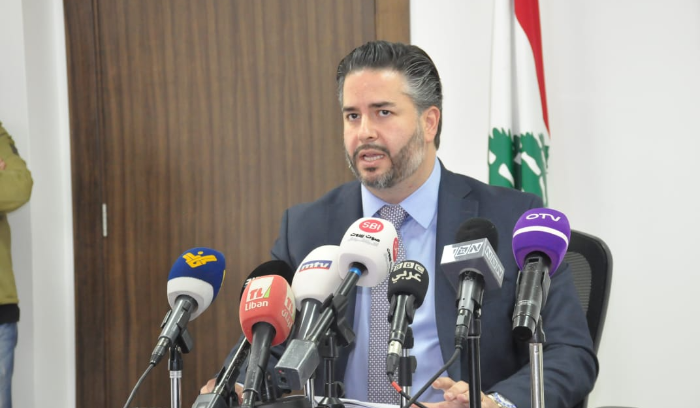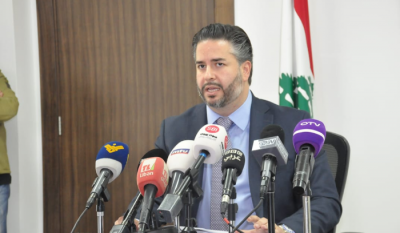The Minister of Economy and Trade in the caretaker government, Amin Salam, held a press conference to discuss the subject of wheat subsidies concerning new decisions taken, and he explained the implementation phase of the emergency loan from the World Bank to support wheat imports.
Salam stated, "The purpose of this press conference is to discuss wheat, subsidies, cabinet decisions, and the recent decisions issued by the Ministry of Economy and the World Bank loan. Our goal today is to re-align the focus onto the right path, because unfortunately, there has been a lot of confusion, misinformation, and unsubstantiated claims circulating that are unfair and harmful to the work aimed at preserving the basic livelihood of citizens."
He added, "For about the past eight months, we have started our journey in the Ministry of Economy, and one of the main files is the issue of wheat subsidies, which is the last refuge for the poorest classes, who today constitute about 80 percent of the Lebanese population according to UN reports. Therefore, the loaf of bread affects all Lebanese people. The Lebanese society is in a difficult situation, and since day one, I have said that the basic livelihood of citizens is a red line that cannot be tampered with. There has been much talk about lifting support and otherwise, and I say with all honesty that we in the Ministry of Economy are preserving the matter of subsidies and rationalizing them according to the logical principles that are applied in all countries, which consider and preserve the interests of their citizens, operating in an organized manner. We have said repeatedly that if support is lifted, it should not be done randomly. Since the first day of my assuming the Ministry of Economy, I have received comments indicating that Lebanon cannot continue supporting. Of course, when any country is in a distressed situation like Lebanon that cannot provide support, we have seen how support was lifted from many commodities in the past randomly, and how that negatively affected the purchasing power of citizens, causing a complete societal collapse without a safety plan."
He continued, "Lifting subsidies must be done according to a comprehensive program, not through arbitrary decisions, because it is not acceptable to tamper with the basic livelihood of citizens. If we do not pay the necessary attention to the loaf of bread or play with it, we would hit everything that remains. I receive daily calls that cause sadness due to the dire living conditions and the inability of people to secure their livelihoods, which is unacceptable and any responsible person cannot accept it. Therefore, we emphasized that tampering with the bread loaf is forbidden, and everything we have done is to preserve it. Some reports from media outlets present completely misleading numbers, indicating the government's dissatisfaction due to waste of materials and the lack of awareness of where the flour is going. I am sorry for that, and I say when addressing these topics, I hope the media will adopt accuracy in numbers."
He added, "We ask the mills to respond to the wrong policies and strategies, and there should have been silos in more than one area to provide reserve stock, rather than having all our stock in one place where the explosion occurred, and we saw what happened. We call on the private sector to maintain a two-month reserve to cover the state's errors. There has been a lot of talk, while we have been requesting the private sector to cover the state's needs since the outbreak of the Russia-Ukraine crisis, and despite our commitment to cooperate with the private sector to secure citizens' livelihoods, we are being targeted and slandered."
He stated, "I wanted to clarify this point because the flaw is neither in the Ministry of Economy nor in the private sector, which we are holding more than its capacity, and I defend it honestly. We cannot harm the Ministry of Economy; the process of purchasing and importing wheat is extremely precise. Today, the mill receives a preliminary acceptance from the Central Bank of Lebanon, and based on that, they raise an order to foreign importers. If all conditions are met, they send the required quantities, and this process takes about a month and is very complex, not as simply as people talk about. No one is allowed to make remarks and engage in populism and reports to speak for the sake of conversation and image in a way that harms instead of benefiting."
He reiterated, "I repeat that there is no decision to lift subsidies. When we saw the state's incapacity to continue supporting, coupled with the start of the Ukrainian war, I approached the Council of Ministers and requested to purchase 50,000 tons of wheat to ensure stock sufficient for two months. I made a decision from the cabinet about two months ago, but no decision was taken in this regard because the state could not secure the funds to purchase the 50,000 tons. A decision to purchase was issued, but no funds were secured."
He went on, "I returned to the private sector asking it to continue buying wheat at the prices we are trying to purchase it (cheap prices) so as not to burden the state beyond its capacity. The private sector took action to address the state's deficiencies. A decision was issued by the government, but it remained just words on paper due to our inability to secure funds. We sought to secure withdrawal rights to provide wheat and medicine; however, with the lifting of support for medicine, this sector was severely hit, and we have seen its grave consequences on society. If we continue to have support for both medicine and wheat, I do not accept, nor does any responsible official, lifting support for them."
He concluded, "We returned and stated that the World Bank, before granting us an easy loan, a form of exceptional social safety net, spent twenty billion dollars on the support basket in the past years before this government. There was no social impact from this, nor do we know the criteria on which support was given; we supported cashew nuts, Nescafe, and others. And today, you come to chase us over the issue of the bread loaf. Our total import for wheat support costs us between 200 and 220 million dollars annually according to global market prices. Is it acceptable in light of the high prices and the decline in purchasing power to lift support from bread? This is unacceptable, and no responsible official can bear the lifting of support from the loaf of bread."
He added, "We approached the World Bank to obtain this easy loan of 150 million dollars, which, like the assistance card, is a fundamental, necessary, and vital loan. I thank the World Bank, which has been positive with us, as it showed willingness to work with us as a Ministry of Economy and offer a loan addressing food security, because it found sincere intentions and genuine management of this file. It is impossible for the World Bank to agree to a loan so easily if it did not see honesty and sincerity in securing this vital material. We saw where the World Bank loans went, but we received this loan's approval in less than a month, and it was approved by the Council of Ministers. Now we raise it to the Parliament."
He wished for the new Parliament to expedite its approval because any delay will delay citizens' livelihoods in about two months, and to implement the loan, we need the Parliament's approval. After its approval, we have about a month of work ahead.




